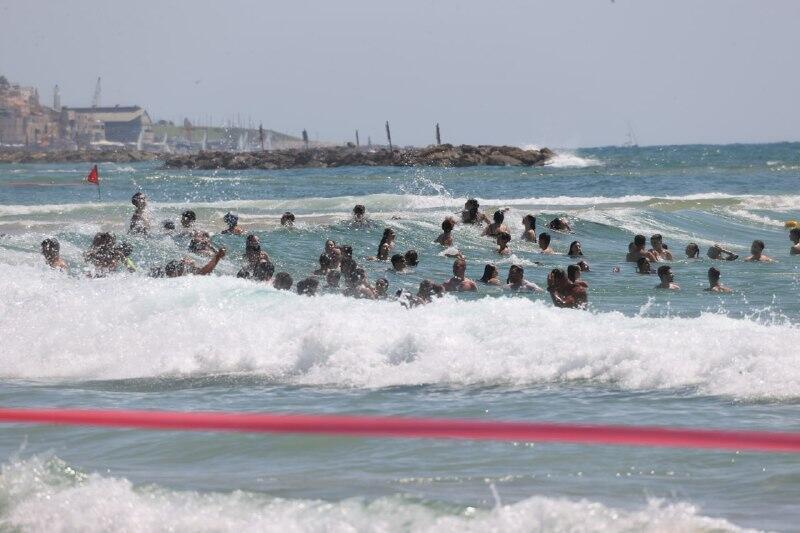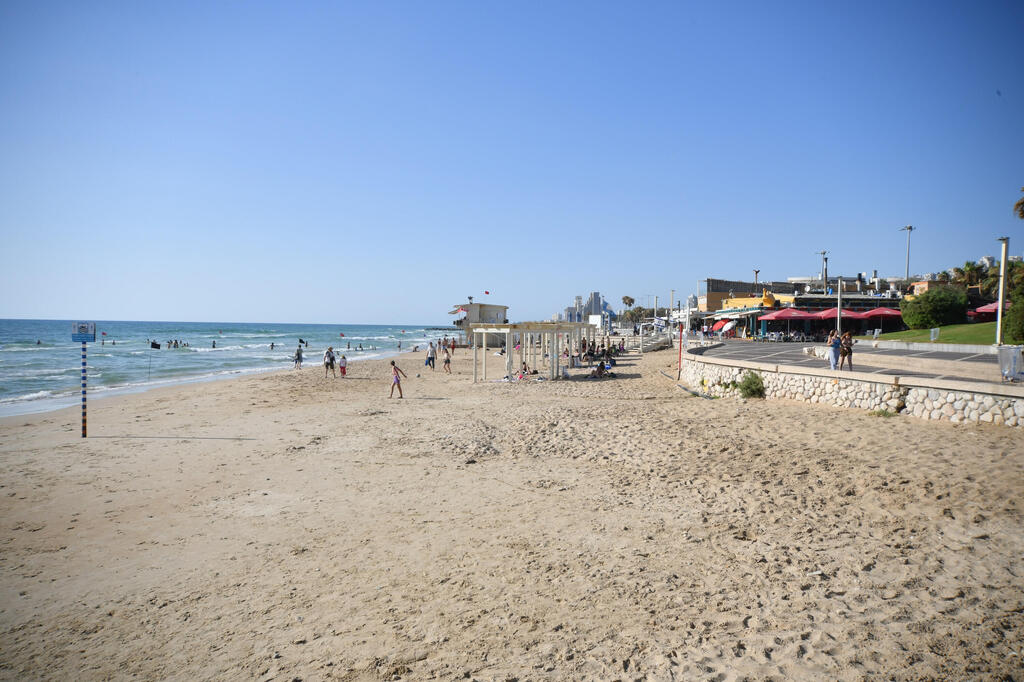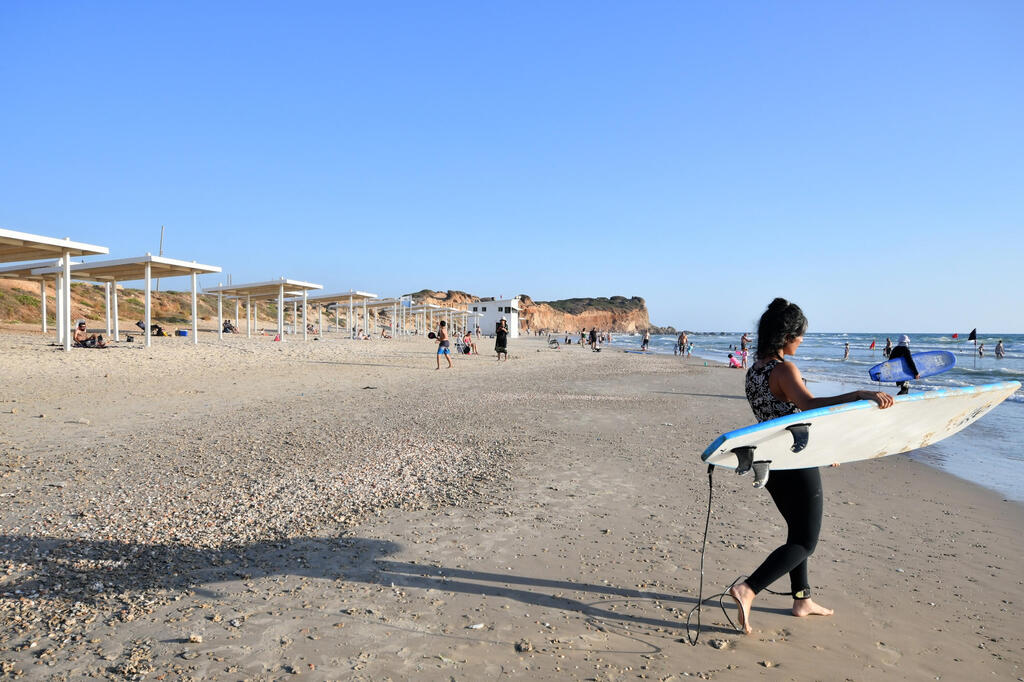Thinking of escaping the heat by heading to the beach? It might be risky; new Health Ministry report indicates four-year high in detection of fecal bacteria in Mediterranean Sea
Adir Yanko, Ilana Curiel|07.04.24
The jellyfish may have come and gone, but don’t rush into the blue Mediterranean waters just yet. A new Health Ministry report indicates a four-year high in the detection of fecal bacteria on Israeli beaches.
Swimmers exposed to high and unusual levels of these bacteria may suffer from gastrointestinal and skin issues. However, not all exposure necessarily results in harm.
Throughout the year, over 7,800 water samples were taken from various beaches across Israel’s shoreline. Of these, 4.1% tested positive for fecal enterococci bacteria and 3.2% for fecal coliform bacteria.
According to the data, the most polluted beach, with the highest percentage of tests showing fecal enterococci, is Haifa’s Quiet Beach, with 14.9% of tests returning abnormal. The highest rate of abnormal enterococci tests was found on the beaches of Rishon Lezion, while the lowest rate was on the beaches of Hadera.
For fecal coliforms, the picture differs: Tel Aviv beaches are the most polluted, while Hadera, Netanya and Rishon Lezion beaches showed no detection of these bacteria.
Water pollution is attributed to several factors, including sewage flow from the Gaza Strip, runoff water that does not infiltrate the soil due to dense construction, sewage flow from within Israel and marine pollution events involving oil.

Throughout the year, over 7,800 water samples were taken from various beaches across Israel’s shoreline. Of these, 4.1% tested positive for fecal enterococci bacteria and 3.2% for fecal coliform bacteria.
According to the data, the most polluted beach, with the highest percentage of tests showing fecal enterococci, is Haifa’s Quiet Beach, with 14.9% of tests returning abnormal. The highest rate of abnormal enterococci tests was found on the beaches of Rishon Lezion, while the lowest rate was on the beaches of Hadera.
For fecal coliforms, the picture differs: Tel Aviv beaches are the most polluted, while Hadera, Netanya and Rishon Lezion beaches showed no detection of these bacteria.
Water pollution is attributed to several factors, including sewage flow from the Gaza Strip, runoff water that does not infiltrate the soil due to dense construction, sewage flow from within Israel and marine pollution events involving oil.

The report summarizes the results of bacteria and pollution monitoring in the Mediterranean Sea, the Sea of Galilee, the Red Sea and the Dead Sea, conducted by the Health Ministry in collaboration with local authorities in 2023. The monitoring focused primarily on fecal enterococci and fecal coliform bacteria. It covers only designated beaches where sampling is done weekly during the bathing season.
Amir Yitzhaki, head of the National Environmental Health Department at the Health Ministry, said, “The report reflects daily work and aims to compare this year’s findings with previous years. The presence of these bacteria indicates a fecal source in the water, and exposure to these bacteria can signal a sanitation problem at the beach. This doesn’t mean that all swimmers exposed to these waters will fall ill, but these are the international standards.”
Regarding the increase in abnormal data, Yitzhaki explained, “There may have been more rainy days this year. Runoff water is not clean. Nature is not sterile, especially in a country where it doesn’t rain constantly. There are many sources of pollution, such as animals, and our country is relatively densely populated.”
The report also noted that “the primary reason for public warnings against swimming at beaches in 2023 was temporary pollution events, whose causes are unclear. In all cases of swimming advisories, extensive resampling and, if necessary, a sanitary survey are conducted.”

The report indicates that Israeli beaches are often closed to swimming for a significant amount of time each year due to pollution from various sources.
“Compared to previous years, the report shows a troubling increase in the number of beach closures during the bathing season, as well as a significant rise in the cumulative number of days the beaches were closed due to pollution,” said Mor Gilboa, CEO of Zalul Environmental Association, which aimd to protect Israel’s seas and streams.
“The main reason for this is the illegal and cross-connections between drainage and sewage systems—a phenomenon that is unfortunately common in many municipalities across the country, even during the bathing season.”
“During significant rain events, we activate the ‘Zalul Samplers’ project, where we take water samples from numerous drainage outlets across the country and find evidence of bacteria and pharmaceuticals, which are the highest indicators of household sewage presence in urban runoff water flowing into the sea and rivers,” Gilboa added.
“We often receive complaints from surfers and swimmers who have been exposed to sewage in the sea and ended up with severe infections and illnesses, sometimes requiring hospitalization. It’s time to put an end to this serious problem that harms both the environment and public health and return the beaches to the public. Especially in these difficult times, they are one of the few refuges for some relief, rest and recreation.”
https://www.ynetnews.com/environment/article/s1jgabndc?utm_source=https://www.ynetnews.com&utm_medium=social&utm_campaign=general_share
